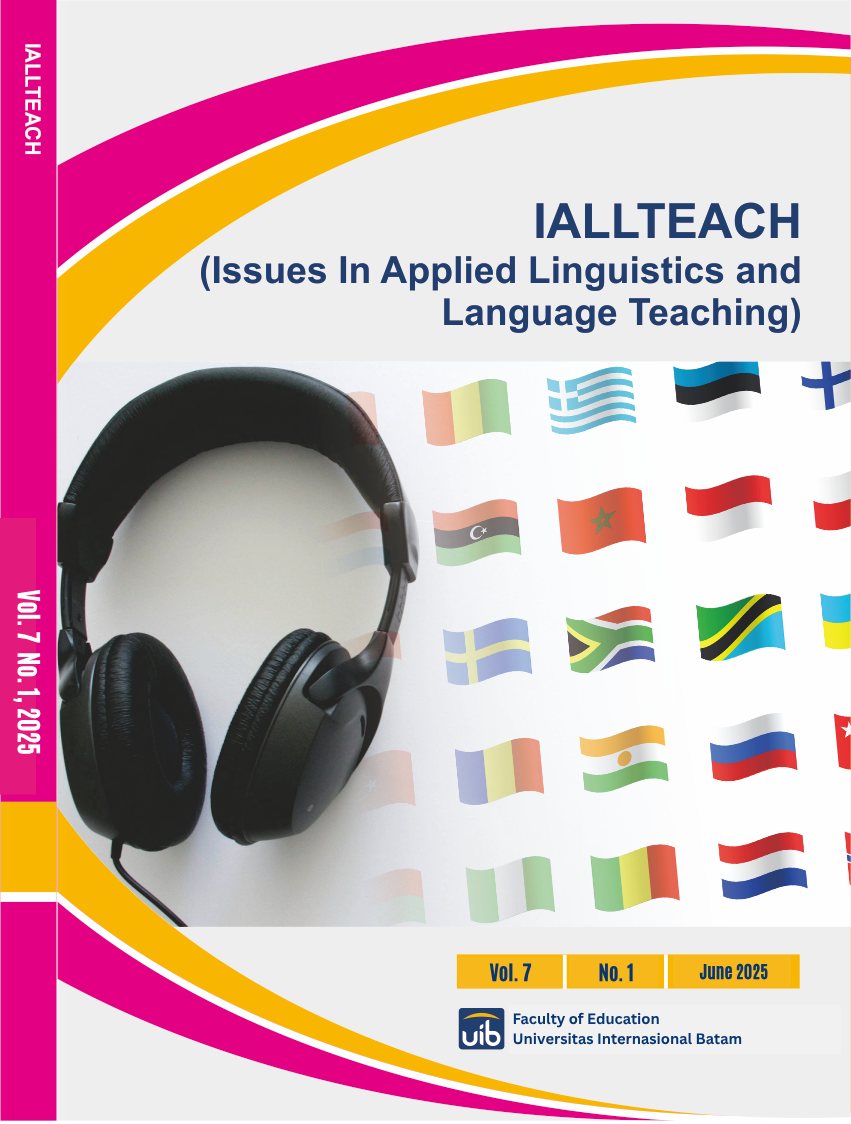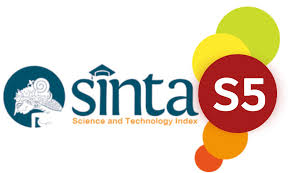A Classroom Action Research: Empowering Students English Grammar Proficiency through PPP (Presentation, Practice, Production) Strategy
DOI:
https://doi.org/10.37253/iallteach.v7i1.10002Keywords:
Classroom Action Research (CAR),, Grammar Proficiency, PPP StrategyAbstract
This study investigates the impact of the Presentation, Practice, and Production (PPP) strategy on enhancing English grammar proficiency among high school students in Batam City. Grammar is essential for effective communication, yet students often struggle due to its complexity, differences from their native languages, and fear of ridicule. Utilizing Classroom Action Research (CAR) over three months with 45 students, the study employed a cyclical process of planning, action, observation, and reflection. Pre-test and post-test evaluations revealed a significant improvement in grammar skills, with average scores rising from 70.00 to 82.62. The PPP method effectively addresses grammar learning challenges by introducing concepts (Presentation), facilitating controlled practice (Practice), and encouraging creative use in communication (Production). The implications of these findings underscore the importance of tailored instructional methods that foster a supportive environment, reducing anxiety and building students' confidence. Integrating the PPP strategy into curriculum development can enhance language learning across diverse contexts, promoting greater student engagement and improved outcomes. Ultimately, this study aims to empower students in their language learning journey, ensuring that all learners, regardless of initial proficiency, can achieve desired outcomes in English communication skills.
Downloads
References
Adedokun, E. T., & Adedokun, T. A. (2024). Avoidance of Complex Grammar by Senior High School L2 English Students: Motivations and Cognition. International Journal of Curriculum & Instruction, 16(2).
Apriliani, D. (2019). The Influence of Using Presentation, Practice, Production (PPP) Technique Towards Students’ Simple Past Tense Mastery at the Eighth Grade of Smpn 1 Katibung South Lampung in the Academic Year of 2018/2019 (Doctoral dissertation, UIN Raden Intan Lampung).
Berry, K. J., Kvamme, K. L., Johnston, J. E., and Mielke, P. W. Jr. (2021). “Central tendency and variability” in Permutation Statistical Methods with R. eds. K. J. Berry, K. L. Kvamme, J. E. Johnston, and P. W. Mielke (Cham: Springer), 125–154.
Bui, T. L. D., & Newton, J. (2021). PPP in action: Insights from primary EFL lessons in Vietnam. Language Teaching for Young Learners, 3(1), 93-116.
Burns, A. (2019). Action research in English language teaching: Contributions and recent developments. Second handbook of English language teaching, 991-1005.
Chang, T.-S. (2020). Multicompetent EFL writers’ use of language repertoire during the composing process across languages: A case study. Lingua, 240, 102822. https://doi.org/10.1016/j.lingua.2020.102822
Cook, V. (2019). Challenging Hidden Assumptions in Language Teaching. LEARN Journal: Language Education and Acquisition Research Network, 12(1), 30-37.
De Pinho Campos, K., Cohen, J. E., Gastaldo, D., & Jadad, A. R. (2019). Public‐private partnership (PPP) development: toward building a PPP framework for healthy eating. The International journal of health planning and management, 34(1), e142-e156. https://doi.org/10.1002/hpm.2714
Elian, I., Musyarofah, L., & Rio Putranto, H. (2023). Perception of EFL Students on the Use of Indonesian Language in English Class. Journal of English Language Teaching and Literature (JELITA), 4(2), 147.
García Botero, G., Questier, F., & Zhu, C. (2019). Self-directed language learning in a mobile-assisted, out-of-class context: Do students walk the talk?. Computer Assisted Language Learning, 32(1-2), 71-97. https://doi.org/10.1080/09588221.2018.1485707
Hamdani, Z., & Amrizal, A. (2018). Presentation–Practice–Production (PPP) Method: An Alternative Method Used in Enhancing student’s Vocabulary Mastery. ETERNAL (English Teaching Journal), 9(1).
Harun, H., Abdullah, N., Ab Wahab, N., & Zainuddin, N. (2017). Concept Based Instruction: Enhancing Grammar Competence in L2 Learners. RELC Journal, 50(2), 252–268. https://doi.org/10.1177/0033688217716505
Hashim, H., Rafiq, R. M., & Md Yunus, M. (2019). Improving ESL learners’ grammar with gamified-learning. Arab World English Journal (AWEJ) Special Issue on CALL, (5). https://doi.org/10.24093/awej/call5.4
Hatim, B., & Munday, J. (2019). Translation: An advanced resource book for students. Routledge.
Hong, A. L., Hua, T. K., & Yang, L. G. (2021). Error types in Malaysian lower secondary school student writing: A corpus-informed analysis of subject-verb agreement and copula be. 3L: Language, Linguistics, Literature, 26(4), 127–140.
Husnaini, H., Yahya, A., & Putri, N. I. W. (2023). The Efficacy of the Presentation, Practice, and Production (PPP) Method on the Speaking Skill of the English Learners Community (ELC) Students. EDULANGUE, 6(1), 45-61.
Indriyani, C. E. (2021). Deductive and inductive instructions for teaching English grammar in online classroom. Lire Journal (Journal of Linguistics and Literature), 5(2), 168-183.
Isbell, D. R. (2019). Diagnostic language assessment for L2 pronunciation: A worked example. Pronunciation in Second Language Learning and Teaching Proceedings, 11(1).
Ishikawa, M. (2018). Written languaging, learners’ proficiency levels and L2 grammar learning. System, 74, 50-61. https://doi.org/10.1016/j.system.2018.02.017
Ismail, I., & Dedi, D. (2021). Grammar learning strategies practice: An investigation of strategies-based instruction effect on grammatical competence.
Isnaini, S., & Aminatun, D. (2021). DO YOU LIKE LISTENING TO MUSIC?: STUDENTS’THOUGHT ON THEIR VOCABULARY MASTERY USING ENGLISH SONGS. Journal of English Language Teaching and Learning, 2(2), 62-67.
Jafaripour, S., & Salehi, H. (2020). Status of Grammar in English Language Teaching. In 8th National Congress of New Finds in English Language Studies, Tehran. https://civilica. com/doc/1128994.
Katemba, C. V. (2022). Vocabulary enhancement through presentation, practice, production (PPP) method in the rural EFL classrooms. Acuity: Journal of English Language Pedagogy, Literature and Culture, 7(1), 88-101.
Le Diem Bui, T., & Newton, J. (2022). Developing task-based lessons from PPP lessons: A case of primary English textbooks in Vietnam. RELC journal, 53(1), 203-215.
Leacock, C., Chodorow, M., Gamon, M., & Tetreault, J. R. (2015). Automated grammatical error detection for language learners. Comput. Linguistics, 41(1), 149-151.
Lee, H., & Yang, J. E. (2019). Science teachers taking their first steps toward teaching socioscientific issues through collaborative action research. Research in Science Education, 49(1), 51-71. https://doi.org/10.1007/s11165-017-9614-6
Li, S. (2020, April). Research on the Feasibility of Implementing PPP in the Chinese Secondary School EFL Context. In International Conference on Mental Health and Humanities Education (ICMHHE 2020) (pp. 247-249). Atlantis Press.
Maldonado Murillo, M. Á. (2023). The presentation-practice-production PPP english teaching method to promote speaking skills in virtual environment (Bachelor's thesis, La Libertad: Universidad Estatal Península de Santa Elena. 2023).
Manfra, M. M. (2019). Action research and systematic, intentional change in teaching practice. Review of Research in Education, 43(1), 163-196. https://doi.org/10.3102/0091732X18821132
Mapunda, E. J., & Vuzo, M. S. (2023). Implicit Teaching of English Grammar and its Implications forthe Building of Communicative Competence in Tanzania. Journal of Linguistics and Language in Education, 17(2), 81-106.
Mariani, N., & Basuki, Y. (2023). English Thematic Integrated Textbook for Young Learners Based on Local Content with a Multiliterative Approach to Pronunciation and Vocabulary Mastery. World Journal of English Language, 13(5).
Ma'rifah, U., Raja, P., & Flora, F. (2022). Modified PPP procedure in teaching conditional sentences through WhatsApp for vocational school students. QALAMUNA: Jurnal Pendidikan, Sosial, dan Agama, 14(1), 133-152.
Marsevani, M. (2023). Boosting Students’ Grammatical Competence through Group Work Activities during Covid-19 Pandemic. Journal of Education Action Research, 7(1), 106-113.
McManus, K., & Marsden, E. (2019). Signatures of automaticity during practice: Explicit instruction about L1 processing routines can improve L2 grammatical processing. Applied Psycholinguistics, 40(1), 205-234.
Nayanathara, G. K., Nilmanthi, R. L. A. B. D., & Dassanayake, D. A. A. K. L. (2023). Effectiveness of teaching vocabulary using PPP approach in a blended learning environment.
Ndraha, L. D. M. (2020). Improving Students Speaking Ability By Using Presentation, Practice, Production (PPP) Method At the Seventh Grade Students of SMP Negeri 2 Telukdalam in 2019/2020. Jurnal Education and Development, 8(3), 923-923.
Nopiyadi, D., Apriani, R., Hamzah, A., & Safinatunisa, I. (2023). Exploring EFL young learners in vocabulary mastery based on PPP approach. Journal on Education, 5(4), 15003-15010.
Oktaviana, D. (2018). Improving The Students’ Simple Present Tense Mastery By Using Presentation Practice Production (PPP) Method At The Eighth Grade of SMP N 1 Pekalongan East Lampung (Doctoral dissertation, IAIN Metro).
Overoye, A. L., James, K. K., & Storm, B. C. (2021). A little can go a long way: Giving learners some context can enhance the benefits of pretesting. Memory, 29(9), 1206-1215.
Pandapatan, A. M. (2020). Analysis of the subject-verb agreement ability among Indonesian English major students as EFL learners. Journal of English Language Studies, 5(2), 127-143.
Pazmiño Vargas, R. J. (2021). Effectiveness of presentation, practice and production method on the development of speaking fluency (Master's thesis, Pontificia Universidad Católica del Ecuador).
Pratista, G. Y. (2023). Presentation practice production vs task-based language teaching: A comparison of two teaching templates. EDUPEDIA, 7(1), 1-13.
Pratiwi, T. L. (2021, July). EFL college students writing anxiety of English language education at Universitas Internasional Batam. In ELT Forum: Journal of English Language Teaching (Vol. 10, No. 2, pp. 100-112).
Purnomo, R., Giyoto, G., Rahmawan, G. A., & Mahsunah, E. (2023). Fostering Collaborative Learning through Presentation, Practice, and Production: Innovative Techniques for Teaching Grammar. JIIP-Jurnal Ilmiah Ilmu Pendidikan, 6(11), 9381-9385.
Rahardjo, A., & Pertiwi, S. (2020). Learning motivation and students’ achievement in learning English. JELITA, 1(2), 56-64.
Schermer, M., & Fosker, T. (2020). Reconsidering methods for systematic classroom observation: the measurement and analysis of categorical time-series observations. International Journal of Research & Method in Education, 43(3), 311-326.
Sundari, H., & Febriyanti, R. H. (2021). The use of first language (L1) in EFL classrooms: Teachers’ practices and perspectives. International journal of education, 14(1), 70-77.
Thornbury, S. (2019). Methodology texts and the construction of teachers’ practical knowledge. In The Routledge Handbook of English Language Teacher Education (pp. 509-521). Routledge.
Ton Nu, A. T., & Murray, J. (2020). Pragmatic Content in EFL Textbooks: An Investigation into Vietnamese National Teaching Materials. Tesl-Ej, 24(3), n3.
van Rijt, J. H., Wijnands, A., & Coppen, P. A. J. (2020). How secondary school students may benefit from linguistic metaconcepts to reason about L1 grammatical problems. Language and education, 34(3), 231-248.
Weda, S., Sakti, A. E. F., & Pasenrigading, A. R. (2020). An exploration of Indonesian EFL learners’ unwillingness to communicate. XLinguae Journal, 13(4), 129-141.
Wesely, P. M., Vyn, R., & Neubauer, D. (2024). Teacher beliefs about instructional approaches: Interrogating the notion of teaching methods. Language Teaching Research, 28(1), 29-51.
Wulandari, D., Narmaditya, B. S., Utomo, S. H., & Prayi, P. H. (2019). Teachers’ perception on classroom action research. KnE Social Sciences, 313-320.
Zhao, Y. (2024). Exploring the Balance between Fluency and Accuracy in Language Teaching Methodologies: A Comparative Analysis of PPP, TBL, CLT, and GTM. Journal of Education and Educational Research, 8(1), 127-130.




.png)






